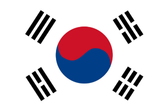
Call 0330 880 3600 Calls may be monitored or recorded. Opening Times.
- TRAVEL INSURANCE
- COVID-19 COVER
- More Options
- Help & Advice
- Existing Customers

Call 0330 880 3600 Calls may be monitored or recorded. Opening Times.

Need help?
UK Customer Services0330 880 3600*
Open Monday to Friday 9:00am to 6pm, Saturday 8:30am to 4pm and closed Sundays.
*Calls are recorded for training and quality purposes.

Official name: Republic of Korea
Capital city: Seoul
Languages spoken: Korean
Population: Around 52 million
Currency: South Korean won (KRW)
Time zone: GMT+9
Driving side: Right
Climate: Temperate with four distinct seasons - cold winters, hot and humid summers
South Korea is a high-tech, modern country with deep cultural traditions, from ancient palaces and temples to cutting-edge cities like Seoul and Busan. Visitors are drawn to K-pop, Korean cuisine, and spectacular landscapes ranging from mountains to islands.
Tensions with North Korea occasionally rise, and while they rarely impact daily life, travellers should stay updated on news and follow local advice. Public demonstrations are common in Seoul and can disrupt travel - it’s best to avoid large gatherings.
South Korea occupies the southern half of the Korean Peninsula, bordered by North Korea to the north, the Yellow Sea to the west, and the Sea of Japan (East Sea) to the east. The country is mostly mountainous, with fertile plains in the west and south.
Incheon International Airport (ICN) near Seoul is the main entry point, with excellent global connections. South Korea has an advanced public transport system, including high-speed trains (KTX). Attractions include Gyeongbokgung Palace, Jeju Island, DMZ tours, and the bustling districts of Gangnam and Myeong-dong.
UK nationals can visit South Korea visa-free for up to 90 days under the K-ETA system, which must be applied for online before travel. The British Embassy is located in Seoul.
The local currency is the South Korean won (KRW). Credit cards are widely accepted, even for small purchases, and ATMs are plentiful. Tipping is not customary, though it may be appreciated in tourist areas.
Healthcare facilities in South Korea are excellent, though treatment costs can be high. Comprehensive travel insurance is strongly advised. Air quality can occasionally be poor due to fine dust pollution, especially in spring. Tap water is generally safe to drink.